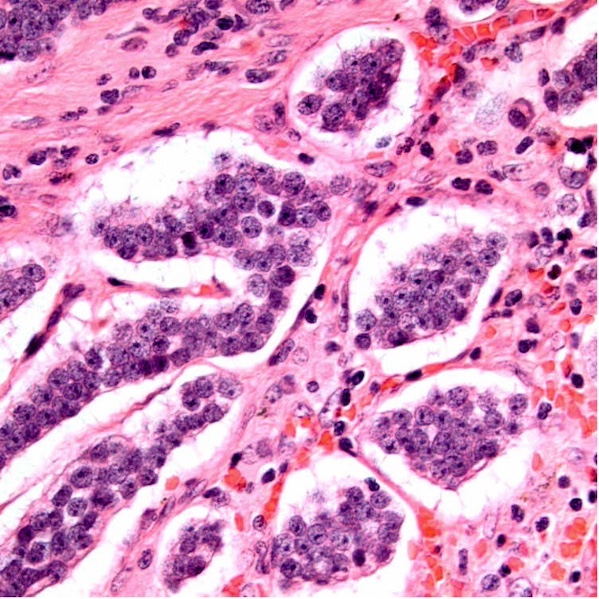New Protein Biomarker to Help Develop Blood-Based Tests for Aggressive Neuroendocrine Carcinomas
February 19, 2024
Source: drugdu
 334
334
 Neuroendocrine carcinomas, such as neuroendocrine prostate cancer and small-cell lung cancer, originate in hormone-releasing cells and can develop in various organs, including the prostate and lungs. While they are not the most prevalent cancer type in these organs, they often have a poor prognosis and limited therapeutic options. Current treatments for these cancers include chemotherapy, radiation, and immunotherapy combinations. Neuroblastoma, predominantly found in young children, develops from immature nerve cells, often in the adrenal glands or nerve tissue along the spine, chest, abdomen, or pelvis. Despite treatment efforts, these therapies only extend survival by a few months, underscoring the need for better therapeutic targets and less invasive diagnostic approaches for these malignancies.
Neuroendocrine carcinomas, such as neuroendocrine prostate cancer and small-cell lung cancer, originate in hormone-releasing cells and can develop in various organs, including the prostate and lungs. While they are not the most prevalent cancer type in these organs, they often have a poor prognosis and limited therapeutic options. Current treatments for these cancers include chemotherapy, radiation, and immunotherapy combinations. Neuroblastoma, predominantly found in young children, develops from immature nerve cells, often in the adrenal glands or nerve tissue along the spine, chest, abdomen, or pelvis. Despite treatment efforts, these therapies only extend survival by a few months, underscoring the need for better therapeutic targets and less invasive diagnostic approaches for these malignancies.
Investigators from the UCLA Health Jonsson Comprehensive Cancer Center (Los Angeles, CA, USA) have identified UCHL1, a protein found in aggressive neuroendocrine carcinomas and neuroblastoma, as a potential molecular biomarker for diagnosing these cancers and predicting and monitoring therapy responses. They also discovered that using a UCHL1 inhibitor, either alone or combined with chemotherapy, significantly delayed neuroendocrine carcinomas and neuroblastoma growth and spread in pre-clinical models. To find druggable targets for neuroendocrine carcinomas and neuroblastoma, the researchers first analyzed publicly available proteomics data and identified UCHL1 as one of the top druggable proteins.
UCHL1 levels in tissues from various neuroendocrine carcinoma patients revealed elevated levels in neuroendocrine prostate cancer, lung carcinoid, small-cell lung cancer, neuroblastoma, and other neuroendocrine neoplasms. This indicates that UCHL1 could be a common drug development target in neuroendocrine cancers due to its higher expression in these tumors compared to non-neuroendocrine tissues. The team then tested the therapeutic potential of blocking UCHL1 in pre-clinical models of neuroendocrine carcinomas and neuroblastoma. This research can help develop new minimally invasive blood-based tests to detect and monitor therapy responses in patients with neuroendocrine carcinomas, such as highly aggressive neuroendocrine prostate cancer and small-cell lung cancer, and neuroblastoma. It also lays the foundation for new clinical trials to test UCHL1 inhibition as a new treatment approach that could help reduce deaths associated with aggressive diseases.
“Our study demonstrates the therapeutic potential of targeting UCHL1 and its utility as a detection tool in neuroendocrine carcinomas and neuroblastoma in pre-clinical models creating a critical translational link between the study and the diagnosis and treatment of patients with these malignancies,” said Dr. Tanya Stoyanova, associate professor of molecular and medical pharmacology and urology at the David Geffen School of Medicine at UCLA.
Source:
https://www.labmedica.com/molecular-diagnostics/articles/294800282/new-protein-biomarker-to-help-develop-blood-based-tests-for-aggressive-neuroendocrine-carcinomas.html
Read more on
- Gusekirumab Injection Accepted by CDE, Multiple Pipelines Advancing Simultaneously March 4, 2026
- Yifan Pharmaceutical’s teriparatide injection has been accepted by the CDE (Center for Drug Evaluation), adding a new domestic player to the osteoporosis treatment field March 4, 2026
- //news.yaozh.com/archive/47318.html PD-1 sales surge March 4, 2026
- A major breakthrough! Roche’s oral BTK inhibitor achieves its third Phase III clinical trial victory, a game-changer in the multi-billion dollar MS (manufactured pharmaceuticals) market. March 4, 2026
- GB19 Injection Approved for Clinical Trials of Cutaneous Lupus Erythematosus March 4, 2026
your submission has already been received.
OK
Subscribe
Please enter a valid Email address!
Submit
The most relevant industry news & insight will be sent to you every two weeks.



